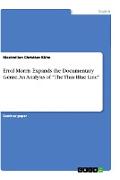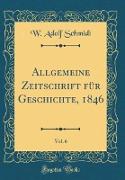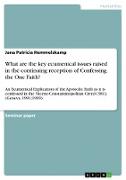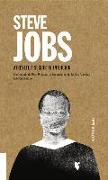Errol Morris Expands the Documentary Genre. An Analysis of "The Thin Blue Line"
BücherAngebote / Angebote:
Seminar paper from the year 2016 in the subject English Language and Literature Studies - Culture and Applied Geography, grade: 1, 0, University of Göttingen, language: English, abstract: In November 1976, the protagonist, Randall Adams, moves to Dallas with his brother Ron. One day after work, he runs out of gas and meets David Harris who picks him up. They spend the evening and night together, drink beer, smoke marijuana, and go to a drive-in movie. Later that night, either Harris or Adams murders police officer Robert Wood during a pull-over on Inwood Road, Dallas. The police department charges the supposed "drifter" Randall Adams, who was sentenced to death in 1977.Errol Morris came across the case, when he interviewed Adams about one of his forensic psychiatrists James Grigson alias "Dr. Death". He recognized the injustices and mistreatment during the investigation and trail of Randall Adams. Therefore, he dropped his previous project to start one about Randall Adams.The filmmaker creates The Thin Blue Line, an investigative documentary, which reviews the event from various perspectives. A common denominator is the extensive use of interviews with the actual people involved in the case and of reenacted scenes. The interviews are conducted with the suspects, David Harris and Randall Adams, the Dallas and Vidor police officers, the attorneys of Adams, three friends of David Harris, the judge, and the witnesses of the trial. Several positive critics and awards show the success of the rather new form in the documentary genre. Morris uses new strategies to make his case for Mr. Adams and opens the door to new techniques, narratives, and interpretations. Hence, the paper deals with the following research question: Is Errol Morris' The Thin Blue Line a new experimental documentary?The paper unfolds the quest for new elements and experimentation in three distinct chapters. The first introduces the documentary genre and presents its traditional and modern features. Those are compared to the documentary The Thin Blue Line. In the following chapter, the debate moves towards the narration in the film, discussing how far a classical, nonlinear, or historical strategy is included. The final chapter examines experimental film features as another part in the documentary. Taken together at the end, the paper shall reveal that experimental and unusual techniques are incorporated, but the documentary does not consciously separate itself from its own genre and purpose. The disruption is not omniscient in the whole film, it rather is a composition between at least two genres and it has an unsettling force.
Folgt in ca. 10 Arbeitstagen




